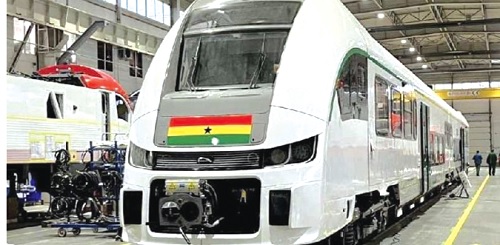
Rodney’s Potpourri: Bringing back golden railway age
A few weeks ago, both traditional and social media platforms were set alight with news of new trains on their way to Ghana from Poland to augment the work being done to revamp the country’s railways.
Initially, the reports said as many as 12 were to be expected, but eventually the Ghana Railway Development Authority clarified the situation and explained, through its CEO, Yaw Owusu, that two were being expected for testing and commissioning on the Tema-Mpakadan Line.
No doubt the expectation is that more will be on the way.
I have always had a soft spot for trains, having grown up in the 1970s in Tarkwa, an iconic town as far as railway travel in this country is concerned.
I always opt for train travel whenever I find myself in another country and it is available.
From a very early age, my parents, my younger sister Benedicta and I would make regular trips to visit my maternal grandmother in Accra by train.
The names of Insu Siding, Huni Valley, Oppong Valley, Achiase and other towns on the route remain burned in my memory.
These towns were together defined by the railway industry and in return they defined the industry, bringing them into a symbiotic relationship particularly in commerce and other economic activities.
I wonder what has become of these outposts, for which the sleeper service in particular was a lifeline.
The words ‘ghost towns’ are not far from my mind.
In those days, my sister and I loved to spend time in the last carriage, which had glass windows all round and afforded panoramic views as the train chugged along.
We loved the sleeper service, which had proper cabin bunkbeds, where one could sleep and dream away as the train ploughed gently through the night, its engines huffing and puffing along the way in a reassuring manner, belching fumes into the night air.
Tarkwa Railway Station had an underground passage (or ‘down blow’, as we called it) through which one could pass to the platforms on the other side, and in the mid-70s, that was a big deal.
Train horns were part of the sounds of the town.
Sad indictment, gradual revival
Somewhere in the 1990s, the railway industry collapsed, leaving in its wake rusty, weed-covered rail lines, abandoned, lonely carriages exposed to the vagaries of the weather and deserted ticket halls that were once beehives of activity, teeming with expectant passengers.
Today the Tarkwa Railway Station building, formerly a beautiful structure that captured the essence of this mining town as one of its icons, stands miserable, its green and cream paint peeled away in a manner akin to its former glory.
The premises have been taken over by a horde of traders, homeless folks, petty crooks and fragrant ladies of the night, well-served by assorted bars and eateries.
It is gratifying to note that in the past decade or so, some significant progress has been achieved in revamping our railway network and several projects have been completed which warm the heart.
According to the Ghana Railway Development Authority, established in 2008, about $30 billion is required to build about 4,000 kilometres of rail network across the country.
Priority projects alone will take $7.8 billion, covering 1,394 kilometres, according to the Ministry of Railway Development.
Clearly this is no pocket change.
Despite the huge price tag, there can be no doubt whatsoever that railway development is a major game changer for our economy and is worth the investment.
Timber, manganese and bauxite all depend on the rail system as a cheaper and easier means of transport.
Rail travel does take the pressure off our road networks in terms of transporting bulky items, which means our roads can last longer.
It was not for the sake of it that the British colonial authorities built railway lines connecting the coast and the mining and agricultural epicentres of the country in the early 20th century.
They were strictly commercial projects to facilitate the pillaging of our natural resources to feed their industrial revolution with the ultimate aim of enriching their economy, no more.
Audacity of hope?
I checked out of Tarkwa many years ago, but my brother Tony still lives there.
Occasionally, I escape there for a quiet weekend, away from the noise, fumes and pressure that Accra has to offer in abundance.
It would be nice, one day, to enjoy a train ride from Accra to Tarkwa for a weekend visit.
First class travel, of course, with a well-stocked, onboard bar in attendance, enjoying some delicious red wine and munching on some snacks, as I watch the countryside roll by with an orange sunset in the distant hills.
That would bring back some wonderful childhood memories.
Audacity of hope, you say?
Well, why not?
Rodney Nkrumah-Boateng,
Head, Communications & Public Affairs Unit,
Ministry of Energy.
E-mail:
